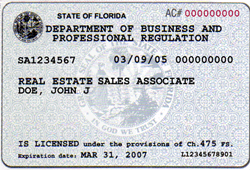For example, just members of an MLS can see the commission split used by the listing agent to buyer representative for bringing consumers to the table - how to become a real estate agent in az. In the normal course of the home purchasing process, regional buyers' agents reveal the noted home to their clients, one of whom decides they wish to buy it.
Assuming the negotiation process, examinations and contingencies of the deal are managed expediently, the deal continues to the closing phase. During the closing, the - a neutral 3rd celebration - manages all the cash. The listing charge is subtracted from the profits of the sale, and after that the staying monies are disbursed to the companies for whom the representatives work.
The companies? I thought you said the listing fee divides between the listing and buyer representatives? Let me describe ... Up until now, here are the individuals included in this example deal: Seller Listing broker represents seller and notes the home on the market Purchaser Buyer's representative represents the purchaser, earns money from the listing broker's commission split In truth, there are 2 more entities included.

Brokers and agents divided the commission, based on a standing contract between the 2, normally 30 to 50%.: There's another scenario where the buy-side commission is split even further - what is a real estate agent salary. When a property representative refers their client to another genuine estate representative (normally in another market), the referring representative is paid a recommendation charge, generally 25% of the buy-side commission.
So, while you may work with a listing representative and accept the terms of the deal, their broker lawfully holds the listing. What's more, all commissions circulation through brokers, on both the buy side and offer side of the transaction. This isn't extremely important to know, as a consumer, but it's something the majority of people do not understand and it's somewhat interesting.

The Only Guide to How To Become A Real Estate Agent In Georgia
Their typical fee is 5 to 6% to list and market a home. Costs are flexible and differ by market based on local custom-made. It's prohibited genuine estate representatives and brokers to collude and fix listing charges; that's an offense of antitrust laws. Some discount rate brokers and for sale by owner (FSBO) business concur to be paid less than the regional standard for listing a house.
What's more, with less cash on the table, discount rate brokers are less most likely to spend what is needed for expert photography, advertising and the myriad of other costs needed for properly marketing and selling a home. So just how are houses marketed? Advertising and marketing budget plans are released the following methods.
Buyer's agents sustain advertising and marketing expenses, too; all representatives require to invest cash on marketing to acquire market share, bring in customers and increase awareness of their brand names. Agents on both sides of an offer have a fiduciary obligation to their customers. This suggests agents need to disclose recognized issues about a property and negotiate in great faith.
There might be a time when a listing agent also represents a buyer (for the very same home), and this is understood as. Due to the fact that double company makes it hard to work out and represent both parties of a realty offer, a number of states restrict the practice. The State of California enables dual firm, but just if the representative or broker completely reveals it to the buyer and seller.
If you're read this far, you now understand how representatives earn money and how commission splits work. You likewise understand that there are more parties to the transaction than just the 2 agents representing the purchaser and seller. Real estate agents incur numerous costs that eat into those seemingly fantastic profits. To be sure, it's enjoyable and satisfying profession with lots of responsibilities.
All about How To Get Started As A Real Estate Agent
Photo by Volkan Olmez on UnsplashAmong the most regular discussions we have with homebuyers at Open Listings has to do with our 50% commission refund and how property agent fees work. Time and time again, we're asked by buyers to debunk this homebuying misconception: Numerous property agents will inform homebuyers that their service is complimentary, and that as a buyer, there's no cost.
Let's take a minute to break everything down: As a buyer, your agent and the seller's agent split a commission fee generally 56% of the purchase rate of the home. And while this fee is technically paid by the seller, it's factored in to just how much sellers note their home for.
Here's what sincere property representatives had to say in articles on Real estate agent. com, HGTV, and The Balance about who pays representative commissions:" Standard practice is that the seller pays the property commission of both the listing agent and the buyer's representative, according to Ruth Johnson, a Realtor in Austin, TX.
com "Who Pays The Realty Representative When You Purchase A Home?"" Sellers consider the expense of commissions when they price their homes. Normally, the listing representative and the buyer's agent split the commission from the transaction. says Jay Reifert of the Excel Exclusive Buyer's Firm in Madison, Wis. 'However you are the only one bringing cash to the closing table.'" Source: HGTV.com "Discover The Pros & Cons of A Purchaser's Representative"" Why? Due to the fact that it's typically part of the list prices.
Take this example of a normal $500,000 home purchase: In the past, a purchaser's realty agent divided the commission cost with the seller's representative timeshare get out due to the fact that getting a buyer to discover a house used to be a lot more tough. Before the internet (we know it was a dark time), purchasers' representatives needed to pull house listings for their clients, drive them around on house tours, price every home based on compensations, and handle all of the offer and closing documents by hand.
The Of How Much Does A Real Estate Agent Make In Florida
The 2. 5% commission you pay them mostly assists to cover these sunk expenses rather than the time they invest assisting get your offer accepted and getting you into your new home. Buyers' representatives work has developed, however their costs haven't. It's basic: because we have actually concentrated on making the homebuying process more effective, which indicates we can pass the savings onto you (how to become a commercial real estate agent).
Rather of relying on just one representative who might or might not be readily available, we have actually created a design where buyers get access to a whole team of homebuying professionals to help, respond to the hard concerns, and reach out to sellers' representatives for property-specific details 9am-8pm, 7 days a week. We have a network of vetted regional showing agents who get paid to do just that: show you homes that you book on-demand and on your schedule, along with answer questions you have when you're at the home.
Due to the fact that our purchasing agents just work with you once you're all set to purchase, they have the ability to offer their competence throughout the most vital part of the purchasing procedure: getting your offer accepted and assisting you through negotiations, closing, and escrow. And, because your buying representative hasn't spent the majority of his/her time driving you around or searching for new customers, we Additional reading can give you full assistance and severe cost savings when you need them one of the most.
